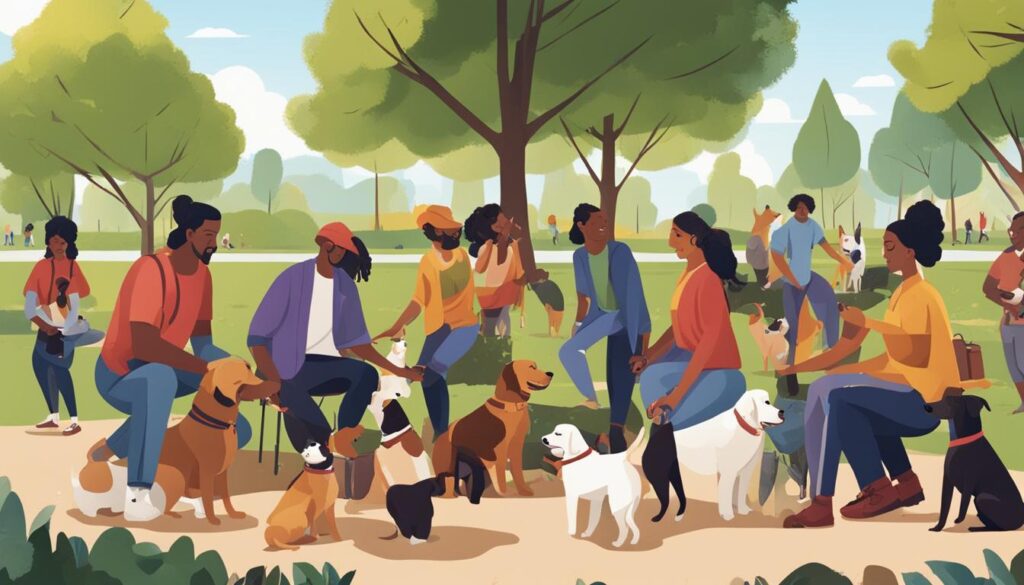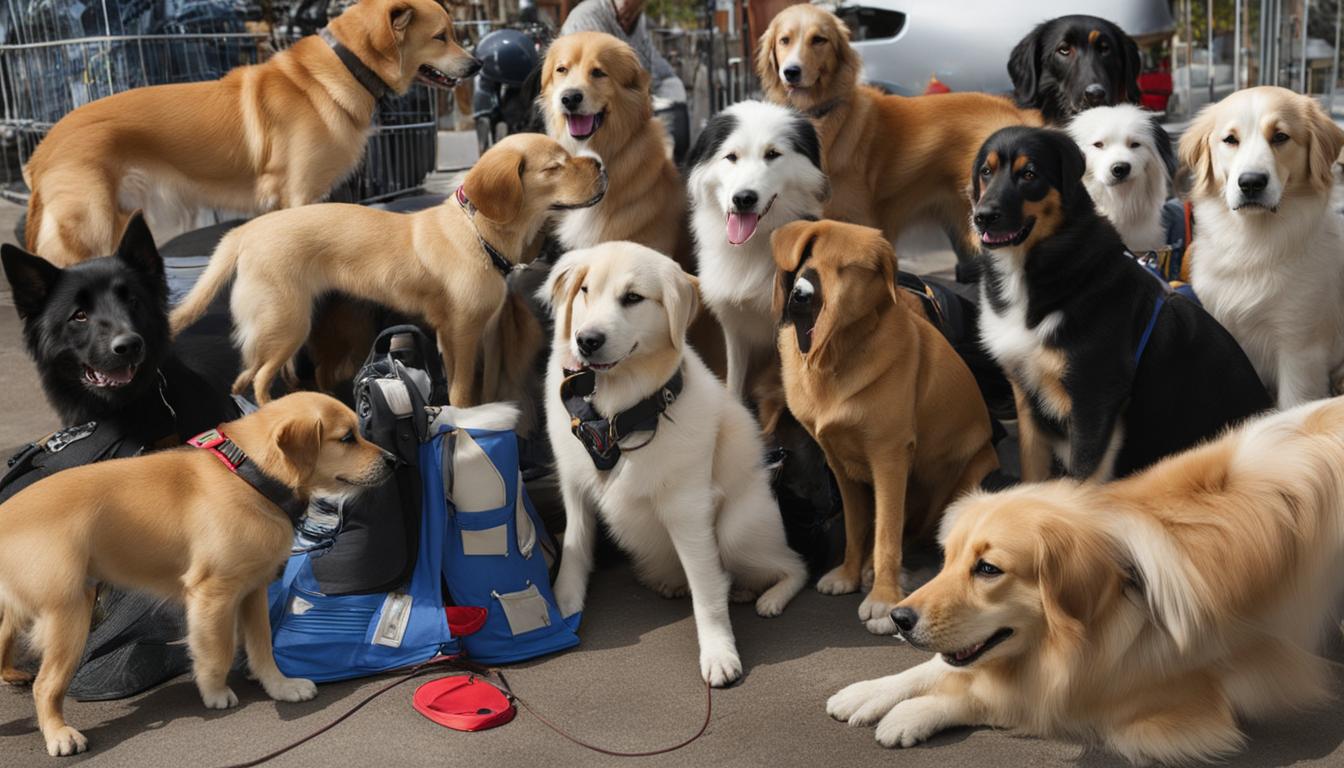Welcome to the wonderful world of canine companions and their incredible contributions to community outreach. As we delve into the heartwarming stories and impactful initiatives involving dogs, get ready to be amazed by their ability to make a difference in the lives of individuals with disabilities. From dog outreach program development to community dog assistance programs, there’s no limit to what these furry heroes can achieve.
At Canine Companions, we’ve been dedicated to enhancing the lives of people with disabilities since 1975. With over 7,300 service dogs placed, we understand the transformative power these four-legged friends possess. Not only do they help individuals regain their independence, but they also provide a much-needed source of companionship and emotional support.
Key Takeaways:
- Dogs play a crucial role in social service programs and community outreach efforts.
- They provide emotional support, companionship, and assistance to individuals with disabilities.
- Dogs in social work have a positive impact on mental health, cognitive abilities, and overall well-being.
- Service dogs are trained to perform specific tasks that assist individuals with disabilities.
- Embracing dogs as social service tools can enhance inclusivity and promote empathy in the community.
The Impact of Dogs in Social Service Programs
When it comes to social service programs and community outreach efforts, dogs have a significant impact that shouldn’t be underestimated. Their presence and involvement can make a world of difference in the lives of individuals with disabilities, providing them with essential emotional support, companionship, and even assistance in daily tasks. But their contributions extend far beyond that, reaching the hearts of people from all walks of life.
Dogs in social work have proven to be effective in reducing stress, anxiety, and depression, offering a sense of comfort and solace to those they interact with. Through therapy sessions, educational programs, and public events, these canine companions bring joy and happiness, fostering social interaction and inclusivity. Whether it’s a child with special needs smiling for the first time or an elderly person finding solace through gentle pets, the impact of dogs in social service programs is undeniable.
“Dogs have a unique ability to connect with people on a deep, emotional level,” says Dr. Emily Carter, a renowned psychologist specializing in animal-assisted therapy. “Their unconditional love and non-judgmental nature create a safe space for individuals to heal, grow, and thrive.”
Benefits of Canine Community Engagement
Canine community engagement provides numerous benefits for both individuals and society as a whole. Studies have shown that dogs can improve mental health, enhance cognitive abilities, and promote overall well-being. By incorporating dogs into social service programs, communities can create a more compassionate and empathetic environment.
- Stress reduction: Interacting with dogs has been proven to lower stress levels and promote relaxation.
- Enhanced social skills: Dogs act as social catalysts, helping individuals develop and improve their social skills and confidence.
- Increased empathy: Interacting with dogs nurtures empathy and compassion, fostering a sense of kindness and understanding among community members.
- Community integration: Canine-focused initiatives provide opportunities for community engagement and intergenerational connections.
| Dogs in Social Service Programs | Community Outreach with Dogs | |
|---|---|---|
| Key Benefits |
|
|
Community outreach with dogs not only benefits individuals but also strengthens the bond among community members. It creates opportunities for education, awareness, and the promotion of a more inclusive society. By recognizing the invaluable contributions of dogs in social service programs, we can build a better future where empathy, compassion, and the well-being of all individuals are prioritized.

Dogs as Service Tools in Public Service Programs
Dogs are invaluable assets in public service programs, contributing significantly to the success and impact of community initiatives. These highly trained canines serve as service tools, aiding individuals with disabilities in various tasks and promoting independence. Moreover, their presence has a positive effect on the community as a whole, fostering empathy, compassion, and community engagement.
Dogs in Public Service Programs
Public service programs involving dogs are designed to address the specific needs of individuals with disabilities. These remarkable animals are trained to perform a range of tasks, including retrieving items, turning on lights, and providing support in crowded public situations. By assisting people with disabilities in their daily lives, service dogs enable them to regain their independence and improve their overall quality of life.
Furthermore, dogs in public service programs have a profound impact on the community. Their involvement promotes empathy and compassion among community members, as they witness firsthand the positive effects of these service animals. They also serve as ambassadors, raising awareness about disabilities and breaking down barriers. Through their presence and actions, dogs in public service programs facilitate education, diversity, and inclusivity within the community.
Community Programs Involving Dogs
Community programs involving dogs extend beyond individual assistance. These programs leverage the innate qualities of dogs to create a positive and inclusive environment. For example, therapy dog programs bring dogs into various settings, such as schools, hospitals, and nursing homes, where they provide emotional support and companionship to individuals in need. The presence of these furry companions has been shown to reduce stress, anxiety, and depression, while promoting social interaction and overall well-being.
Additionally, community programs involving dogs organize events and activities that promote community engagement. These initiatives might include dog-friendly gatherings, workshops on responsible pet ownership, or pet adoption drives. By including dogs in these programs, communities foster a sense of unity and create opportunities for education and awareness. Dogs not only enhance the overall experience but also serve as catalysts for connection and relationship building within the community.
| Program | Benefit |
|---|---|
| Service Dog Program | Improves independence and quality of life for individuals with disabilities. |
| Therapy Dog Program | Provides emotional support, reduces stress, and promotes social interaction. |
| Community Engagement Events | Fosters unity, empathy, and awareness within the community. |
Community programs involving dogs offer a powerful avenue for creating an inclusive society. By recognizing the unique abilities of dogs and implementing canine-focused social initiatives, communities can enhance empathy, compassion, and overall well-being. Let dogs continue to be valuable service tools, bringing joy, support, and connection to public service programs and the wider community.

Conclusion
Dogs are not just pets; they are invaluable social service tools that bring joy and support to communities. Through their involvement in outreach programs and initiatives, these four-legged heroes make a real difference in the lives of individuals with disabilities and the community as a whole. By embracing dogs as social service tools and implementing canine-focused social initiatives, we can create a more inclusive and compassionate society.
Canine companions offer more than just assistance; they provide love, hope, and a sense of belonging. Their presence alone can brighten someone’s day and bring comfort and companionship to those who need it most. Whether they are participating in therapy sessions, educational programs, or public events, dogs have a unique ability to promote social interaction, reduce stress, and enhance overall well-being.
When we incorporate dogs into community outreach efforts, we foster empathy and compassion. These furry ambassadors bring people together, creating opportunities for education, awareness, and understanding. The impact of community programs involving dogs cannot be overstated, as they not only improve the lives of individuals with disabilities but also strengthen the bonds within our communities.
So, let’s unleash the potential of dogs as social service tools and embrace canine-focused social initiatives. Together, we can build a society that values inclusivity, promotes empathy, and recognizes the incredible impact that our four-legged companions have on our lives and communities. Let dogs be the heroes that inspire change and make the world a better place.





